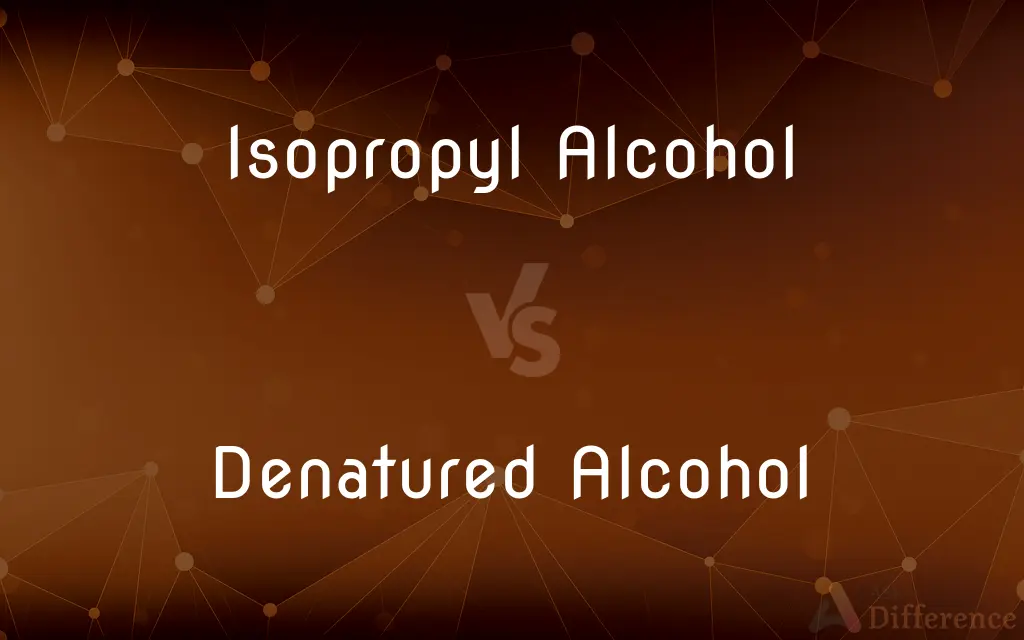Isopropyl Alcohol vs. Denatured Alcohol — What's the Difference?
Edited by Tayyaba Rehman — By Maham Liaqat — Published on March 8, 2024
Isopropyl alcohol is a solvent and disinfectant commonly used in cleaning and sanitizing, known for its quick evaporation. Denatured alcohol is ethanol made unfit for drinking by adding chemicals, used in various industrial and cleaning processes.

Difference Between Isopropyl Alcohol and Denatured Alcohol
Table of Contents
ADVERTISEMENT
Key Differences
Isopropyl alcohol (IPA) and denatured alcohol serve as solvents and cleaning agents but have distinct compositions and applications. IPA, with a concentration typically around 70-99%, is favored in medical settings and for household cleaning due to its effectiveness against bacteria, viruses, and fungi. It's also used in personal care products and as a solvent in industries.
Denatured alcohol, essentially ethanol with additives to prevent consumption, varies in formulation. These additives can include methanol, isopropyl alcohol, and other substances, making it toxic if ingested. It's utilized in applications where ethanol's solvent properties are needed without the regulatory and tax implications of beverage-grade alcohol, such as in manufacturing, pharmaceuticals, and as a fuel or cleaning agent.
The key difference lies in their intended use and safety for human contact. IPA is generally safe for topical use and in products like hand sanitizers, whereas denatured alcohol's toxicity makes it unsuitable for direct skin contact in its undiluted form and dangerous for ingestion. Both are effective cleaners, but IPA is preferred for surfaces that come into contact with skin.
Regulatory distinctions also apply, as denatured alcohol is often subject to less regulation and taxation than consumable ethanol due to its deterrent additives. This makes it a cost-effective choice for industrial applications. However, the presence of toxic substances in denatured alcohol requires careful handling and storage to avoid accidental poisoning.
In terms of efficacy, both IPA and denatured alcohol can dissolve oils, fats, and some inks, making them useful for cleaning and degreasing. IPA's relatively mild nature compared to denatured alcohol's variable composition can influence the choice between them based on the specific needs of the application, including safety, efficacy, and cost considerations.
ADVERTISEMENT
Comparison Chart
Composition
Consists mainly of isopropanol (70-99%).
Ethanol mixed with denaturing agents (e.g., methanol, IPA).
Common Uses
Disinfecting, cleaning, personal care products.
Industrial solvent, manufacturing, cleaning.
Safety for Human Contact
Generally safe for topical use.
Toxic if ingested, can be harmful on skin depending on formulation.
Regulatory Status
Subject to regulations based on concentration and use.
Less regulated due to denaturing agents, not fit for consumption.
Applications
Medical settings, household cleaning, cosmetics.
Industrial applications, manufacturing processes.
Efficacy as a Cleaner
Effective against a wide range of microorganisms.
Effective solvent, varies with formulation.
Toxicity
Low toxicity when used properly.
High toxicity, not safe for ingestion or direct skin contact in undiluted form.
Cost
Comparatively higher due to purity and safety standards.
Lower, due to being unfit for consumption and less regulated.
Compare with Definitions
Isopropyl Alcohol
Known for quick evaporation and minimal residue.
Electronics are often cleaned with isopropyl alcohol to avoid water damage.
Denatured Alcohol
Effective for cleaning surfaces without leaving residue.
Denatured alcohol is ideal for cleaning glass and metal surfaces.
Isopropyl Alcohol
A solvent and disinfectant used for cleaning and sanitizing.
Isopropyl alcohol is used to disinfect medical equipment.
Denatured Alcohol
Used in manufacturing and industrial applications.
Denatured alcohol serves as a fuel for marine stoves.
Isopropyl Alcohol
Utilized in personal care items like hand sanitizers.
Hand sanitizers often contain 70% isopropyl alcohol for germ-killing.
Denatured Alcohol
Ethanol altered to prevent consumption, used as a solvent.
Denatured alcohol is used in paint thinners and removers.
Isopropyl Alcohol
Safe for topical use in proper concentrations.
Isopropyl alcohol can be used to clean skin before an injection.
Denatured Alcohol
Contains additives making it poisonous if ingested.
The methanol in denatured alcohol can cause blindness or death if swallowed.
Isopropyl Alcohol
Found in a variety of household cleaning products.
Isopropyl alcohol wipes are popular for quick disinfection of surfaces.
Denatured Alcohol
Regulations vary due to its toxic additives.
Denatured alcohol is available without a liquor tax due to its non-consumable nature.
Common Curiosities
What is isopropyl alcohol used for?
Isopropyl alcohol is used for disinfecting, cleaning, and as a solvent in personal care products.
Why is alcohol denatured?
Alcohol is denatured to make it unfit for consumption, allowing it to be used in industrial applications without the taxes and regulations associated with beverage alcohol.
Can you substitute isopropyl alcohol for denatured alcohol?
Substitution depends on the application. For cleaning purposes, they may be interchangeable, but for personal care or where toxicity is a concern, isopropyl alcohol is preferred.
Can denatured alcohol be used for disinfecting?
Yes, but its suitability depends on the formulation. It's effective as a solvent and cleaner but may not be safe for all disinfecting applications due to its toxicity.
How do you safely store isopropyl and denatured alcohol?
Both should be stored in a cool, well-ventilated area away from heat sources and open flames, in tightly closed containers to prevent evaporation and contamination.
Can either be used in homemade hand sanitizers?
Isopropyl alcohol is recommended for homemade hand sanitizers due to its effectiveness and safety for skin contact, unlike denatured alcohol, which can be toxic.
Why is denatured alcohol cheaper than isopropyl alcohol?
Denatured alcohol is cheaper due to its non-consumable status, which exempts it from beverage alcohol taxes and allows for cheaper production costs.
Are there environmental concerns with using these alcohols?
Both have environmental impacts, including potential air and water pollution. Proper disposal and minimal use in well-ventilated areas are recommended to mitigate risks.
Is isopropyl alcohol safe on skin?
Isopropyl alcohol is generally safe for topical use in concentrations such as 70%, but it can cause irritation or dryness with prolonged exposure.
What are the health risks of denatured alcohol?
Ingesting or prolonged skin contact with denatured alcohol can lead to serious health risks, including poisoning, organ damage, or death.
Share Your Discovery

Previous Comparison
NPT vs. MIP
Next Comparison
Lactide vs. LactoneAuthor Spotlight
Written by
Maham LiaqatEdited by
Tayyaba RehmanTayyaba Rehman is a distinguished writer, currently serving as a primary contributor to askdifference.com. As a researcher in semantics and etymology, Tayyaba's passion for the complexity of languages and their distinctions has found a perfect home on the platform. Tayyaba delves into the intricacies of language, distinguishing between commonly confused words and phrases, thereby providing clarity for readers worldwide.













































